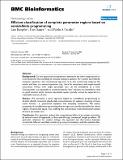Efficient classification of complete parameter regions based on semidefinite programming
Author(s)
Kuepfer, Lars; Sauer, Uwe; Parrilo, Pablo A.
Download1471-2105-8-12.pdf (401.7Kb)
PUBLISHER_CC
Publisher with Creative Commons License
Creative Commons Attribution
Terms of use
Metadata
Show full item recordAbstract
Background: Current approaches to parameter estimation are often inappropriate or inconvenient for the modelling of complex biological systems. For systems described by nonlinear equations, the conventional approach is to first numerically integrate the model, and then, in a second a posteriori step, check for consistency with experimental constraints. Hence, only single parameter sets can be considered at a time. Consequently, it is impossible to conclude that the "best" solution was identified or that no good solution exists, because parameter spaces typically cannot be explored in a reasonable amount of time. Results: We introduce a novel approach based on semidefinite programming to directly identify consistent steady state concentrations for systems consisting of mass action kinetics, i.e., polynomial equations and inequality constraints. The duality properties of semidefinite programming allow to rigorously certify infeasibility for whole regions of parameter space, thus enabling the simultaneous multi-dimensional analysis of entire parameter sets. Conclusion: Our algorithm reduces the computational effort of parameter estimation by several orders of magnitude, as illustrated through conceptual sample problems. Of particular relevance for systems biology, the approach can discriminate between structurally different candidate models by proving inconsistency with the available data.
Date issued
2007-01Department
Massachusetts Institute of Technology. Department of Electrical Engineering and Computer ScienceJournal
BMC Bioinformatics
Publisher
BioMed Central Ltd
Citation
BMC Bioinformatics. 2007 Jan 15;8(1):12
Version: Final published version
ISSN
1471-2105